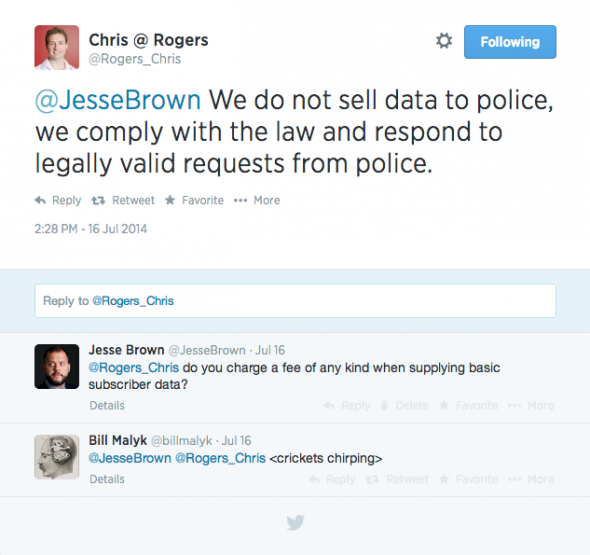

Last week, Rogers announced that they were getting out of the snitch business. Until then, the company ratted out its own customers to government agencies hundreds of thousands of times every year. Without asking for a warrant, Rogers provided subscriber data to authorities that linked real names to all kinds of private online expression and activity. On a previous episode of CANADALAND, The Citizen Lab’s Christopher Parsons described the common practice among telecom companies of charging police and other agencies a fee of $5-$15 each time they came knocking.
The Supreme Court has since ruled that this kind of warrantless information sharing is an illegal violation of individual privacy. Only then did Rogers desist, and I took the opportunity to remind people just what they had been up to, over a period of time that we learned in today’s Toronto Star stretches back to at least 2006. Here’s what I tweeted:
This is huge. Rogers previously sold the data of 100s of thousands of customers to police w/out warrants. No more. bit.ly/Wb3PF3
I soon received a public response from “Chris @ Rogers” (@Rogers_Chris), an official Rogers social media presence who I will assume is an actual person.
@JesseBrown We do not sell data to police, we comply with the law and respond to legally valid requests from police.
Of course, in complying with thousands (millions?) of warrantless police requests, the highest court in the country has ruled that Rogers was in fact not complying with the law, but let’s leave that aside for a moment and deal with the matter in contention: was subscriber data provided by Rogers for free, or did police pay for it? Suspecting that Chris was relying on some semantic quibble about the difference between the terms “charging a fee” and “selling,” I asked for clarity in my response:
@Rogers_Chris do you charge a fee of any kind when supplying basic subscriber data?
Chris wrote back suggesting that we take the conversation private. He promised to have someone “more familiar” with this issue follow up with me via email. That was last Thursday.
I’m still waiting.
UPDATE – JULY 28 –
A Rogers rep, Kevin Spafford, got in touch after I posted the article above. He confirmed that “in some cases we charge a minimal fee” when providing law enforcement officials with customer data. When asked how much this fee is and how often it is charged, Spafford declined to provide details, answering instead that the fee varies depending on the amount of work required to provide the information, and that “in most cases” no fee is charged. Given the enormous volume of data requests, this leaves much room for interpretation, leaving the public in the dark as to whether Rogers has been collecting hundreds, thousands, or millions of dollars in return for providing information to police on its customers.